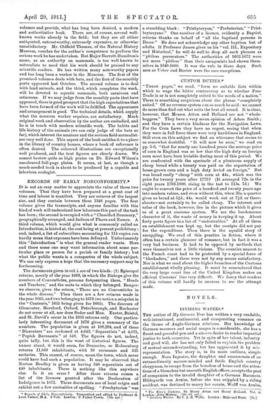CUSTOM DUTIES.*
" THESE pages," we read, " form no suitable lists within which to wage the bitter controversy as to whether Free Trade is or is not completely suited to the needs of a nation." There is something suspicious about the phrase "completely suited." Of no revenue system can so much be said : we cannot do more than find out what suits the best all round. It is clear, however, that Messrs. Atton and Holland are not " arhole- hoggers." They have a very mean opinion of Adam Smith ; and they have a certain kindness for the Navigation Laws. For the Corn Laws they have no regret, seeing that when they were in full force there were very hard times in England. Still even on this subject we find an utterance that seems to us somewhat doubtful. " It will now be seen," we read on pp. 5-6, "that for nearly one hundred years the average price of corn in England was so low that the high duty on foreign corn must have been leviable during most of this period. We are confronted with the spectacle of a plenteous supply of cheap bread while a bounty was paid on the exportation of home-grown corn and a high duty levied on foreign." But was bread really " cheap " with corn at 44s., which was the price for twenty years after 1773 ? (It averaged 72s. in the eight years 1793-1800, rising in the last to 113s. 7d.) We ought to convert the price of a hundred and twenty years ago into modern values, and even without this, when 31s. a quarter gives us bread at 51d., 44s. would work out at 71d. or there- abouts—not certainly to be called cheap. The interest and value of the book, however, lies in the picture which it gives us of a great customs system. We see the burdensome character of it, the waste of money in keeping it up. About forty ports figure in a list of "undesirables." At all of them an establishment was kept up, but the receipts did not pay for the expenditure. Then there is the squalid story of smuggling. We read of this practice in fiction, where it often has a certain glamour of romance, but in fact it was a very bad business. It had to be opposed by methods that were themselves not a little vicious. The counties nearest to the French coast had to be protected by a special force of "blockaders," and these were not by any means satisfactory. Nor is what we read about the higher branches of the Customs establishment wholly pleasing. It must be remembered that the very large coast line of the United Kingdom makes an, efficient Customs' line very difficult. We fancy that readers of this volume will hardly be anxious to see the attempt made.


























































 Previous page
Previous page